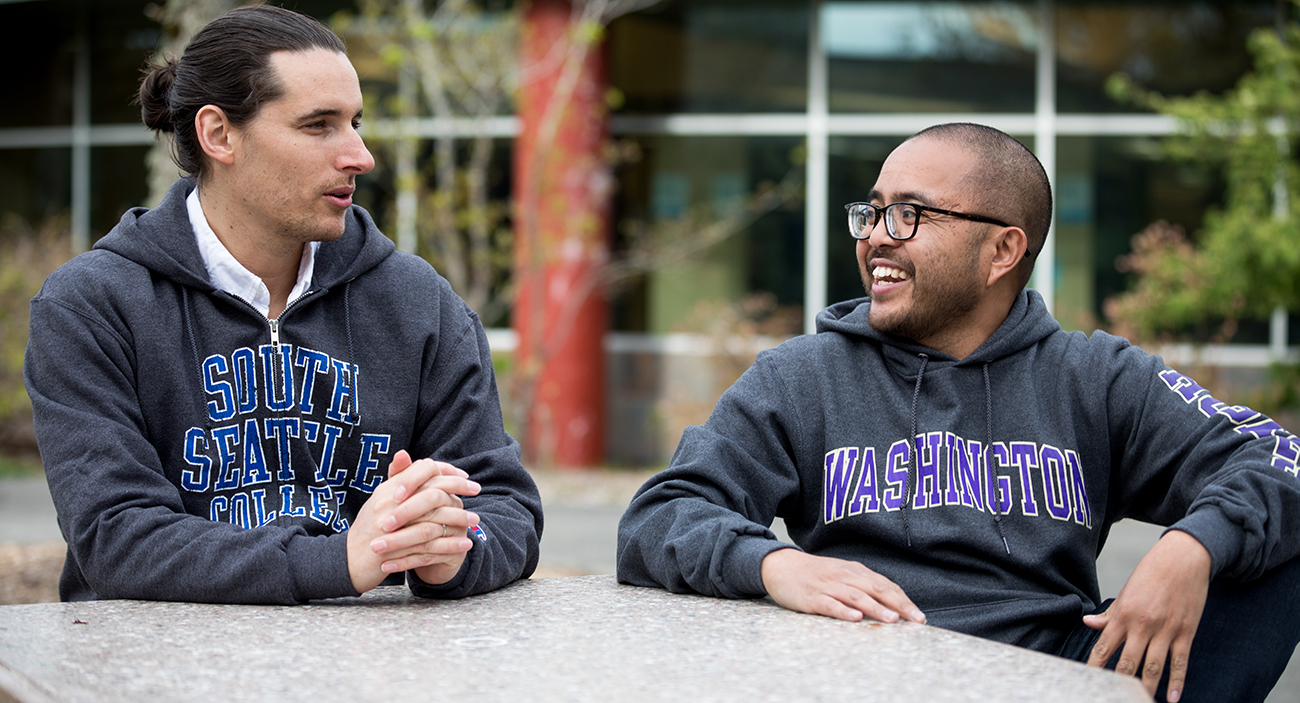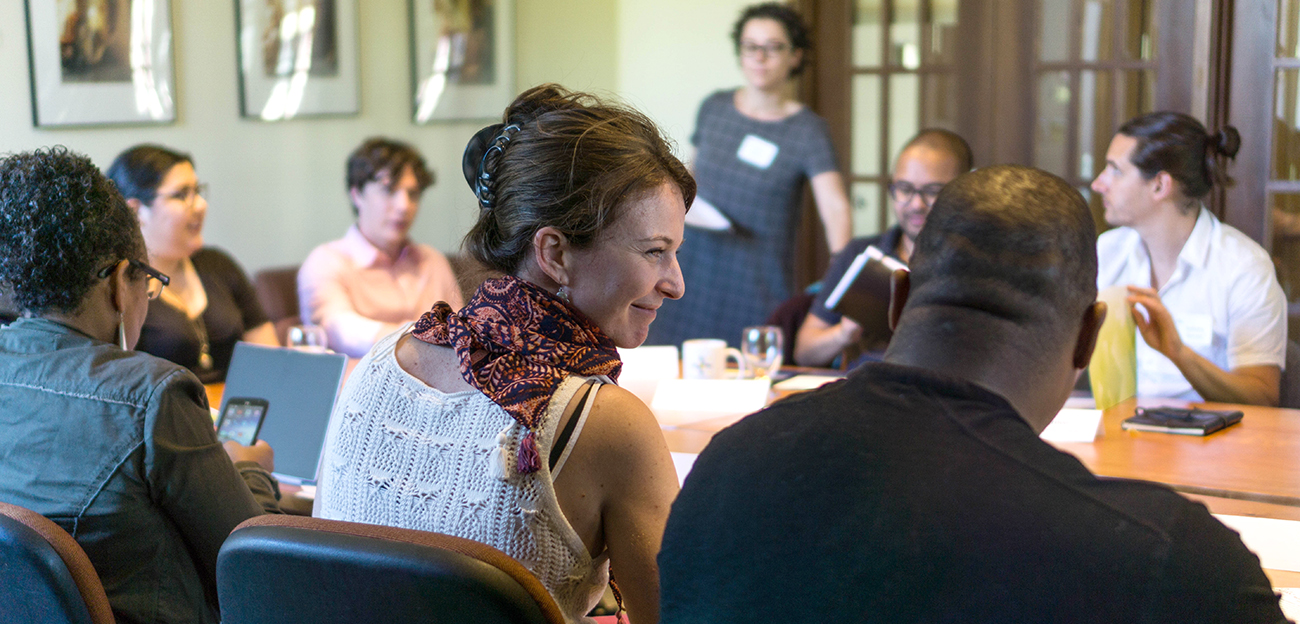As a community college student in San Diego, Paul Tubig was drawn to philosophy. Now a doctoral student in philosophy at the University of Washington, Tubig finds himself once again spending time at a community college. It feels different this time around.
“Having attended a community college, it’s been interesting to re-enter that setting as an aspiring professor and PhD student who has been acculturated in the university context,” Tubig says.
Tubig’s return to community college is through a fellowship from the UW Simpson Center for the Humanities. He’s one of six UW PhD students serving as Mellon Fellows for Reaching New Publics in the Humanities, each paired with a faculty mentor in their discipline at North Seattle College, Seattle Central College, or South Seattle College for one year. The fellowships are part of Reimagining the Humanities PhD and Reaching New Publics, a program launched by the Simpson Center in 2015 with support from the Andrew W. Mellon Foundation.

“Teaching at a community college can be very different than teaching at a research university,” says Annie Dwyer, assistant program director for Reimagining the Humanities PhD. “There is a higher percentage of students of color and first-generation college students as well as greater socio-economic diversity. Because of this, community colleges provide important opportunities for educational access and social mobility.”
Despite that, PhD students preparing for academia often overlook two-year colleges as a career option. Or they are told that community college teaching is less desirable than a position at a four-year institution. But for aspiring professors committed to access, diversity, and social justice, teaching at a community college may be the best fit. Mellon Fellows have the opportunity to explore that path, and to reflect on the increasingly vital role of two-year colleges in higher education.
Some [Mellon Fellows] have said the fellowship totally transformed the way they see themselves fitting within higher education.
Each fellow dedicates a minimum of 30 hours per quarter to the project. How they spend their time is intentionally undefined. “Students can bring their own interests and commitments to bear on their fellowship experience,” says Dwyer, noting that many fellows immerse themselves in the classroom, attend faculty meetings, or develop a specific project. “But much of the really productive time is spent simply talking with their faculty mentor about what their working day is like, what their students are like, and then seeing this firsthand.”
Guillaume Tourniaire, a doctoral student in the UW School of Drama, connected with his mentor immediately when he began his year-long Mellon Fellowship in 2017. He was paired with Shelley Douma, a drama professor at Seattle Central College, who welcomed him into her classes and theater rehearsals and spoke frankly about the challenges and fulfillment of teaching drama at a community college.

“Shelley represents the dedication and devotion I hope to give to my students, actors, and community once I have completed my studies,” says Tourniaire. “Our relationship was one of collaboration and camaraderie. I got much more out of the bargain than I think the program ever advertised.”
Tourniaire was inspired to become a Mellon Fellow after learning that half of his UW students had started at two-year colleges. He recognized that learning more about their journey would help him better connect with all of his students. At Seattle Central College, he worked as an assistant director and dramaturg for a Molière play directed by Douma. He saw firsthand her focus on teaching and student access despite limited funding.
Like Tourniaire, Tubig — whose mentor is South Seattle College philosophy professor Anthony Ferrucci — also noticed the emphasis on teaching. He says that UW faculty, even those who are passionate about teaching, put more of their energy toward publishing their work and advancing the field of philosophy. “In contrast, the community college professors I worked with seemed to take their role as teachers as primary. They put more care and creativity into making their courses more inclusive to the plurality of their students.”
The whole idea of what makes certain schools ‘better’ has been redefined for me.
Tubig and other current fellows share their observations in a Reimagining the PhD blog on the Simpson Center website. They also attend workshops and quarterly meetings for fellows at the Simpson Center throughout their fellowship year. The gatherings, which Tourniaire describes as “a grounding force,” encourage fellows from various disciplines to compare notes, often revealing underlying commonalities — most notably a deep respect for the dedication of community college faculty.
By voicing that respect in their UW departments, the fellows affirm the importance of two-year colleges, challenging the long-held perception of community college faculty positions as less worthy. The fellows are also helping to create new connections between two-year and four-year colleges.
Dwyer says that many current and former Mellon fellows have been inspired to pursue a position at a community college or other teaching-intensive institution. “Some have said the fellowship totally transformed the way they see themselves fitting within higher education,” Dwyer says. Other fellows, including Tourniaire and Tubig, hope to balance teaching and research at an institution that honors both. But, says Tourniaire, “the whole idea of what makes certain schools ‘better’ has been redefined for me.”
. . .
Learn more about the Mellon Fellows for Reaching New Publics in the Humanities program.
More Stories

AI in the Classroom? For Faculty, It's Complicated
Three College of Arts & Sciences professors discuss the impact of AI on their teaching and on student learning. The consensus? It’s complicated.

A Love of Classics and Ballroom
Michael Seguin studied Classics at the UW and now owns Baltimore's Mobtown Ballroom. The two interests, he says, are more connected than they might seem.

A Sports Obsession Inspires a Career
Thuc Nhi Nguyen got her start the UW Daily. Now she's a sports reporter for Los Angeles Times, writing about the Lakers and the Olympics.